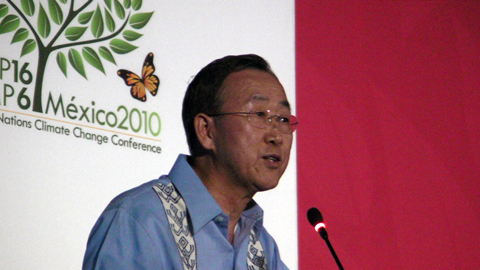 Andrew C. Revkin On Tuesday, United Nations Secretary General Ban Ki-moon urged climate negotiators in Cancún to keep seeking progress.
Andrew C. Revkin On Tuesday, United Nations Secretary General Ban Ki-moon urged climate negotiators in Cancún to keep seeking progress.CANCÚN, Mexico — China and the United States, thanks to some innovative proposals from India, have inched toward agreement on ways to measure and verify countries’ actions under a new climate agreement, should the outline of one start to emerge as formal negotiations crest here as two weeks of talks end Friday.
As has long been the situation in these talks, the stances of these countries, the two dominant sources of greenhouse gas emissions, largely shape prospects for the world at large to move beyond the weak terms of the 1992 Framework Convention on Climate Change and the limited scope of the Kyoto Protocol. That pact restricts emissions from most industrialized countries, but both of the greenhouse giants, for different reasons, are not bound by its terms. The exiting Kyoto targets expire at the end of 2012 and there are few signs that any countries are prepared to commit to new binding limits in the absence of commitments from the two sparring superpowers.
You can get the details from John Broder’s news story and more context from Kate Sheppard of Mother Jones. And paste the #cop16 hash tag into Twitter.com for lots more coverage.
Despite the rhetorical movement, all signs in this process still point away from any new legally binding treaty emerging for years to come, if ever. Instead, you’ll see engagement and “soft” commitments, all of which is a good thing, and a shift toward more partnerships involving investments in technology and development projects that can help poor countries blunt climate impacts and fill their glaring energy gap.
One other glaring gap here is the lack of discussion of commitments, partnerships and direct investments in technology advancement through basic research and building large-scale demonstrations of systems that private companies will never commit to testing on their own. (I’ll be writing more on this before the week is out.)
The prime issues remain China’s coal thirst and the United States Congress, particularly the Senate, which must give consent by a 67-vote majority before the United States can ratify a treaty. I’ll be publishing a piece in a day or so rounding up efforts to look behind China’s murky firewall for coal and energy data and clarify what’s happening there with both coal and non-polluting energy options. (Many signs indicate that the “green” energy moves are on top of coal growth, not instead of it.)
As for Congress, the Obama climate team has always bluntly communicated the limits on presidential discretion under the Constitution in explaining what the country can, and can’t commit to in these negotiations. Remember the recent fights over 60 votes? As just one sign of resistance there in the absence of concrete steps by China, see the report released this morning by Senator James Inhofe, Republican of Oklahoma, on China’s unrelenting drive to build its prosperity on coal combustion (following the American pattern of course).
As this tussle plays out, representatives from tiny nations here are seething, although not exhibiting the explosive anger that disrupted the talks last December in Copenhagen. On a panel I ran Tuesday night for the United Nations Foundation, Ronny Jumeau, the Seychelles ambassador to the United Nations, expressed quiet exasperation on behalf of small island nations that expect to feel outsize impacts from rising seas. ( Here’s a Webcast of that discussion.)
“Give us something,” he said. “Anything.”

